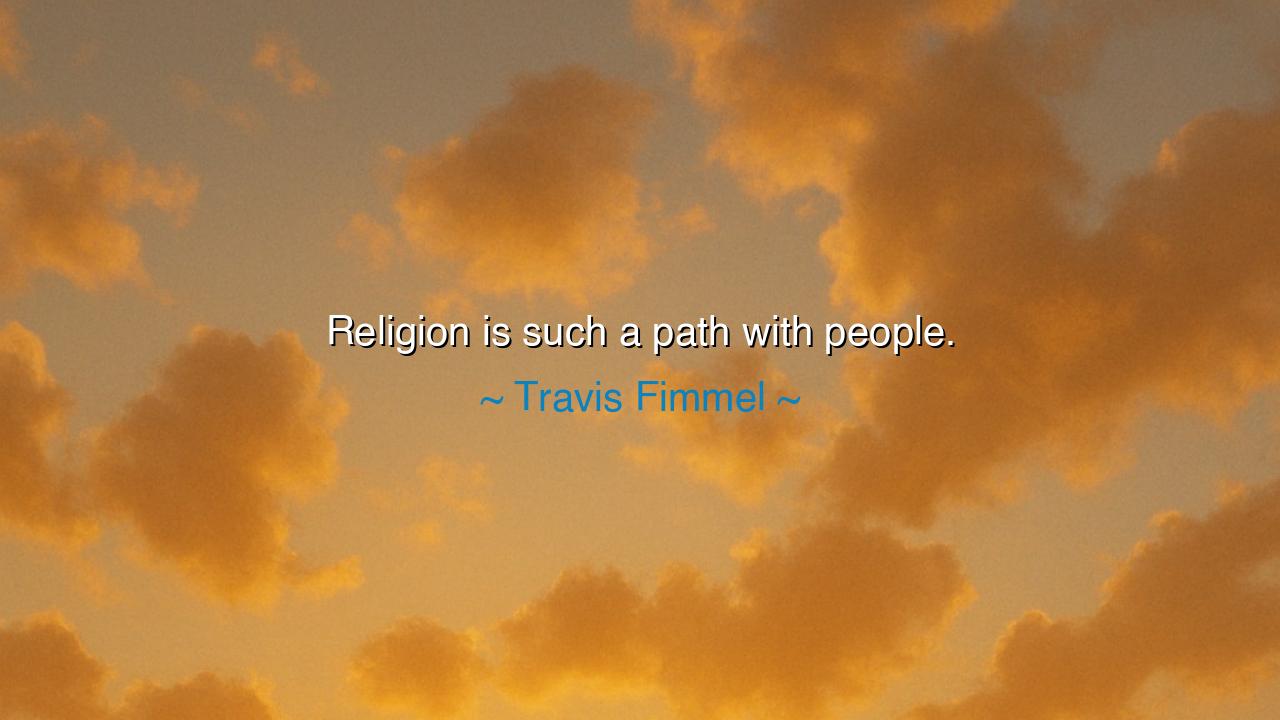
Religion is such a path with people.






“Religion is such a path with people.” — these words, spoken by Travis Fimmel, carry the quiet gravity of one who has seen both faith and conflict, both reverence and division. Fimmel, known for his role as Ragnar Lothbrok in the series Vikings, spoke not as a scholar, but as a man reflecting on the nature of belief — on the strange, winding road that faith becomes when walked by human feet. Beneath this simple phrase lies a deep truth: that religion is not a fixed monument, but a journey, and that those who tread it often find both light and darkness along the way. It is a path, not a destination — and like all paths, it is shaped by the travelers who walk it.
When Fimmel says that “religion is such a path,” he speaks to the way faith winds through the human heart — unpredictable, personal, and often perilous. Religion, in its purest form, is meant to lift man toward the divine, to give order to chaos, meaning to suffering, and hope to despair. Yet once it enters the realm of men, it becomes mingled with all that we are — our fears, our pride, our longing to be right, our hunger to belong. Thus the path of religion becomes a mirror of the human condition: noble, yet flawed; radiant, yet shadowed. Fimmel’s words do not condemn religion, but rather illuminate its complexity — the way it both binds and divides, enlightens and blinds, depending on how one walks the path.
The origin of this reflection lies in the spirit of the Viking world that Fimmel’s character inhabited — an age when old gods met the new, when the Norse and the Christian faiths collided like storms over the same sea. The show Vikings itself captures this truth: faith is both the weapon and the wound. Ragnar, though born into the worship of Odin, questions the gods of his fathers when he meets the Christian monk Athelstan. Their friendship becomes a living parable — the Norseman seeking glory, the monk seeking grace — and through their struggle, both begin to see that the divine is not confined to a single name or symbol. Religion, indeed, is a path — winding, converging, diverging — and the wise traveler learns to walk it with humility rather than arrogance.
History, too, bears witness to this truth. Consider the life of Saint Francis of Assisi, who was born into wealth but found truth only when he abandoned it all. For him, religion was not about ritual or conquest, but about living the teachings of love and poverty he saw in Christ. He walked barefoot upon the earth, calling every creature “brother” or “sister.” To him, religion was a path of living compassion, not a system of dominance. Yet in his own time, even his message of peace faced resistance from within the very Church he served. So it has always been: religion becomes divided when men forget that it was never meant to glorify themselves, but to lead them closer to God and to one another.
Fimmel’s simple phrase holds within it the ancient paradox of faith: that it is at once the most intimate and the most communal of journeys. Each person must walk it alone, yet no one walks it without others. There are those who will walk it upright and gentle, and others who will trample it in haste or hatred. The same road that leads one man to enlightenment may lead another to fanaticism. The difference lies not in the path itself, but in the heart that treads it. As the ancients said, “The way is not in the sky; the way is in the heart.”
And so, Fimmel’s insight becomes both warning and wisdom. Religion is not wrong because it divides, nor right because it unites; it is powerful because it reflects the souls of those who hold it. The same faith that inspires charity in one may breed cruelty in another. The same scripture that heals may, in the wrong hands, be used to harm. Therefore, the wise must walk the path of religion with mindfulness, aware that what they carry in their hearts will shape the world around them. The divine is not reached through dogma, but through understanding, compassion, and the courage to look beyond oneself.
So, my friends, the lesson is clear: walk your path, but walk it gently. Do not mistake the road for the destination, nor the symbol for the truth it represents. If religion is your guide, let it guide you toward kindness, not conquest. If faith is your strength, let it strengthen your love, not your pride. Remember that all paths — Christian, Muslim, Hindu, Buddhist, or any other — wind through the same wilderness of the human soul, seeking the same light beyond the hills.
And when you meet another traveler walking a different road, do not curse him for his direction. Instead, share a moment of understanding beneath the same sky, for the path of religion — as Fimmel reminds us — is not the possession of one people, but the journey of all mankind. For it is not the name of the god that makes the soul holy, but the heart with which one walks the path.






AAdministratorAdministrator
Welcome, honored guests. Please leave a comment, we will respond soon